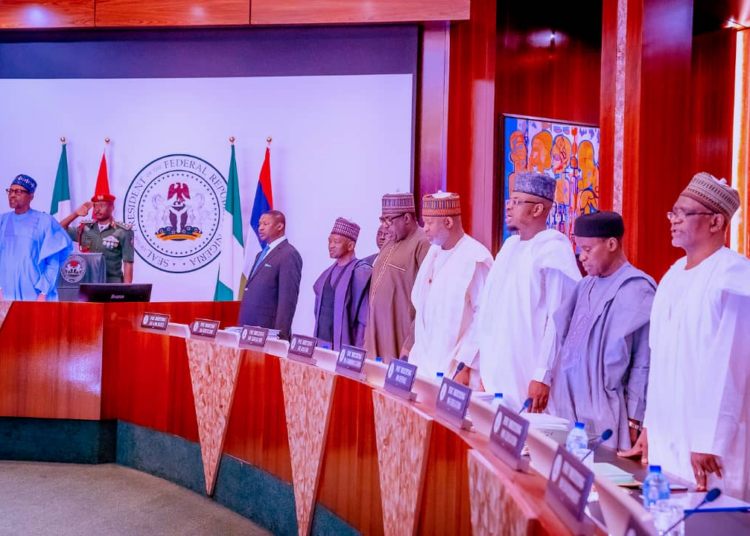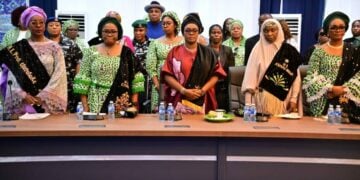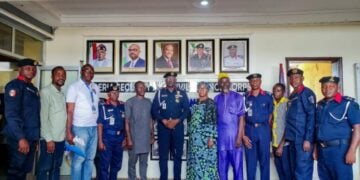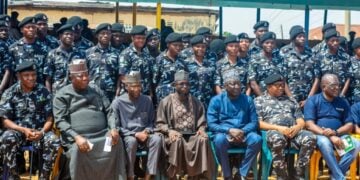President Muhammadu Buhari Tuesday in Abuja declared that making infrastructure development a key point of focus in his administration was a deliberate action to create wealth and make poverty alleviation easier.
Speaking at the virtual commissioning of three bridges, three secretariats and one road project undertaken by his administration, the President in a statement by presidential spokesman, Garba Shehu, defended criticisms of the debt profile of his administration saying, “we do not act on infrastructure by accident. It has been a deliberate choice for our government as a tool to fight poverty, to create economic growth and employment and to open the path of prosperity for our people.”
He emphasised that while he shared the concerns of Nigerians, the debts were tied to projects that have been executed in very transparent circumstances and are there for everyone to see.
He added that the wealth of other nations is traceable to their investments in infrastructure made possible by debts redeemed over decades.
Buhari’s Huge Parting Debt Profile
“As we look at the debt profile, I urge us to also look at the assets and investment profiles, some of which were paid for by debt and some by investment income.
“In 8 (Eight) years, I am proud to say that we have doubled Nigeria’s stock of infrastructure to GDP from about 20% to over 40% and that is no small undertaking.
“The projects that we hand over today apart from others such as rail, sea and airports, gas pipeline projects that have been previously completed, symbolise our country’s sharp focus on delivering prosperity,” he said.
Elaborating on the significance of the projects, which he described as frontal efforts to address multi-dimensional poverty as well as improve business efficiency and service delivery time, President Buhari said of the three bridges are for specific purposes.
“The Ikom Bridge is meant to boost trade in and around the Calabar Port and Free Zone and facilitate transport connectivity from the South-South, through the North Central to the Northeast. This is a bridge across the Cross River itself.
“The Second Niger Bridge, which has been long in the making, and is certainly now a reality, is a bridge of choice across the River Niger to bring relief to those crossing from the Southeast to the Southwest.
“The Loko-Oweto Bridge, across the River Benue will provide a shorter connectivity for those traversing from Benue to Nasarawa and the Federal Capital Territory. It cuts off travel through Lafia and provides connectivity to Keffi and to Abuja,” he explained.
President Buhari also commissioned 200 kilometres out of the 365 kilometres Abuja-Kano highway noting that the road, the Second Niger bridge and the Lagos-Ibadan Expressway were all funded partly from dividend income earned from investment in the Nigeria Liquefied Natural Gas (NLNG), repatriated funds from overseas, and recoveries from proceeds of crime successfully prosecuted at home.
“This is an example of the change that we promised; to invest dividend income in visible assets that last for generations and to put proceeds of crime to public and enduring use for the country.
“Our anti-corruption approach does not end in courts. Stolen and recovered assets are utilized for the common good,” he stressed.
The President also commissioned three Federal Secretariats in Anambra, Bayelsa and Zamfara States, believing that they would “reduce the cost of governance by bringing federal civil servants under one roof for efficient service delivery,” thereby reducing expenditure on rent for office spaces.
He also named the Secretariats after distinguished Nigerians as follows:
Dr. Goodluck Ebele Jonathan Federal Secretariat in Yenagoa, Bayelsa State;
Ebele Okeke Federal Secretariat in Awka, Anambra State; and
Malam Yahaya Gusau Federal Secretariat in Gusau, Zamfara State.
In his remarks, the Minister of Works and Housing, Babatunde Raji Fashola, said the construction of the infrastructure generated economic activities around them, providing means of livelihood for hundreds of thousands who worked there.
According to him, “travel time is reduced by more than 50% in many of the places we surveyed; Property values of landowners have appreciated by up to 30% in the surveys conducted on land values where we have delivered infrastructure.”
The Minister added that these are some of the attempts by Government to push back against multi-dimensional poverty.
Goodwill messages were delivered at the event by the Governors of Anambra, Imo and Delta States, Minister of Labour and Employment as well as the Obi of Onitsha and the Asagba of Asaba.





